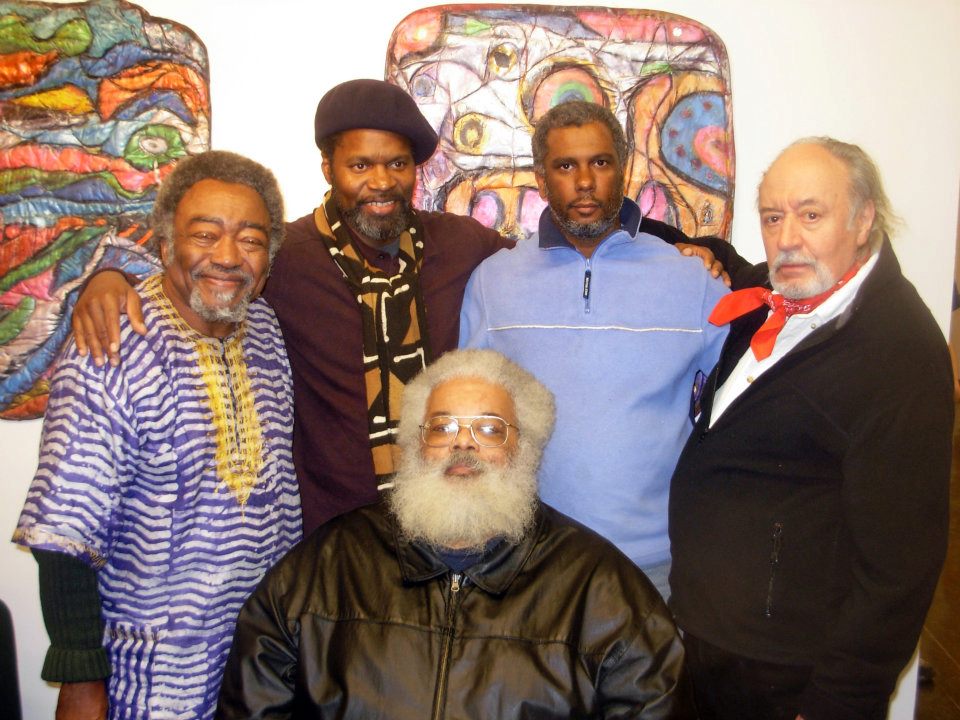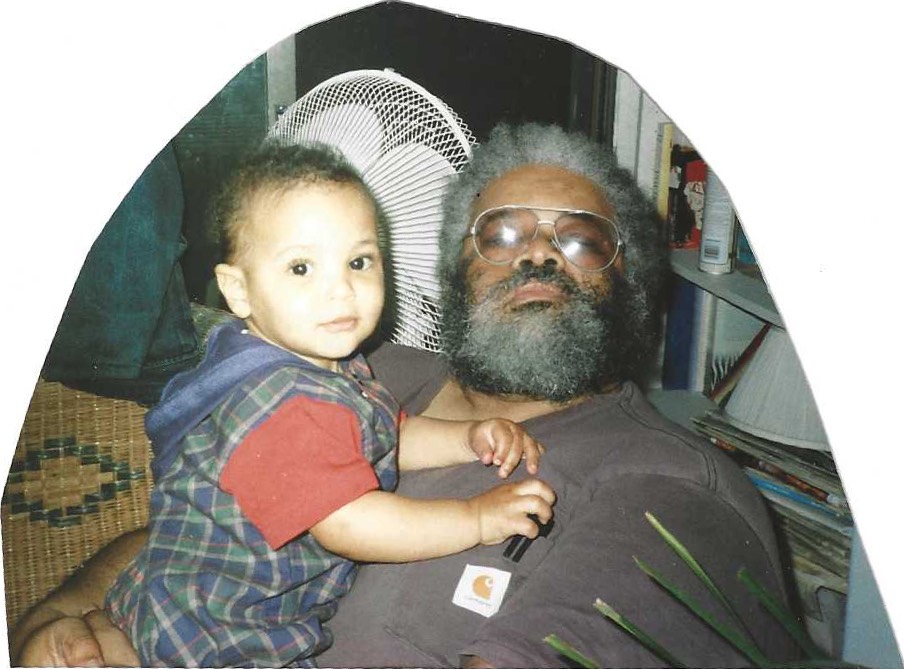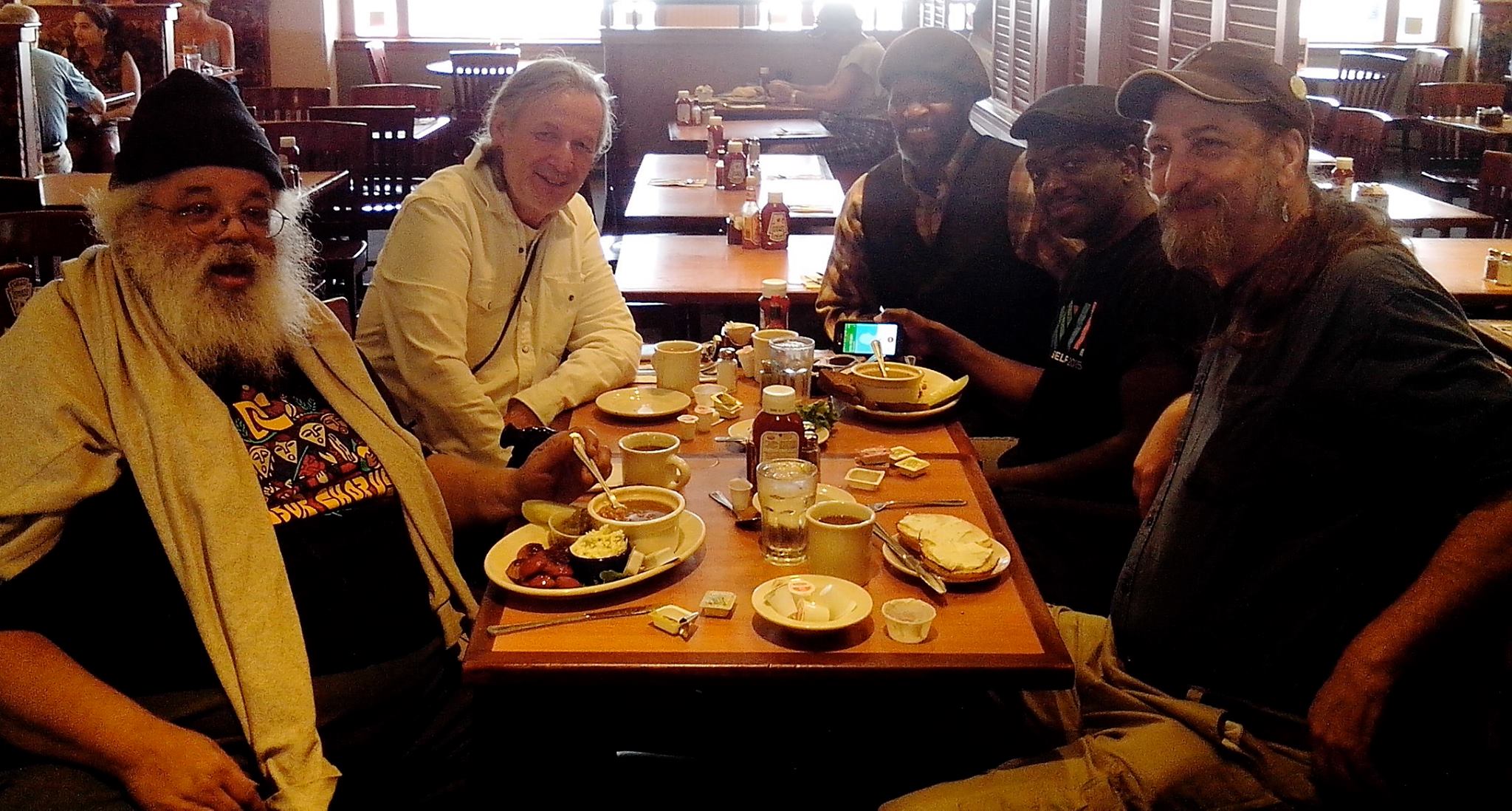It was with profound sadness that I heard of the passing of our friend and comrade Gary Hicks on December 2nd 2022, in California’s Bay area, at the age of 76. He was a formidable fighter for the working classes and for suffering people in general, including the homeless whose condition remained of deep concern to him for most of the last half of his life.

From left to right: Poets Askia Touré, Tontongi, Neil Callender, Aldo Tambellini, and Gary Hicks (center) circa 2010 —photo Tanbou.
I first met Gary Hicks in a class he taught at the now closed Center for Marxist Education in Cambridge, Massachusetts. The course was on Karl Marx’s Gundrisse, his youthful notes on the revolutionary process and socialist political economy. Gary had a keen and penetrating knowledge of Marx’s philosophy; he would cite him casually, even in non-political social settings.
We would later become good friends. During the mid-years of the first George Bush administration to the first years of the Clinton administration, Gary and I collaborated in various public readings on politically engaged poetry, Black liberation, Haitian and African-American resistance. We both became contributors to the Stone Soup poetry venue in Cambridge, animated by the legendary Jack Powers. Gary was the more constant and continual presence in this well-venerated gathering of poets of all stripes, tastes, and lyrical inspirations.
It was always interesting to see the dynamic between this unabashed Communist poet and Jack Powers, who seemed to have a profound affection for Gary Hicks. Gary never missed an opportunity to blend a well-chosen poetic metaphor into political events of the day, and the public would applaud with more of a sense of congenial camaraderie than ideological devotion, but with always a kind of appreciation for his deep convictions.
In 1992, Gary Hicks and I co-authored the chapbook The Dream of Being, out of concerns for the deterioration of political conditions not only in US, but also abroad, such as the trampling of Palestinian rights in the occupied territories, the Apartheid system in South Africa, the putschist military dictatorship in Haiti.
In 1994, as a result of the so-called Republican Revolution which brought the most anti-people, rejectionist Republicans to power in both houses of Congress, Gary Hicks was among many voices in the Boston area that called for resistance and for an alternative revolutionary path. It was at that time that he, Aldo Tambellini and I started to talk about the possibility of a poets’ resistance front or collective to counter the reactionary public discourse. We were later joined by Askia Touré, Brenda Walcott, Jill Netchinsky, and Anna Wexler to form the nucleus of what became known as The Liberation Poetry Collective (later joined by Joselyn Almeida, Neil Calender, Tony Van Der Meer, Soul Brown, Patricia Frisella, Everet Hoagland, Tony Medina, Richard Cambridge, Ashley Rose Salomon, Marc Goldfinger, and many others).
Gary Hicks had a hard life ever since the original injustice committed against him by the powerful US security establishment. At the age of nineteen, in the 1960s, he refused the military draft in protest of the US war in Vietnam and, as a consequence, was given a three-year prison sentence. The deprivation of these three important years of Gary’s life for refusing, like Muhammad Ali, to be part of this war of domination would mark this young man for the rest of his life—although, a real African phoenix, he found new ways to sustain his soul, to reaffirm life’s meaning in solidarity with others.

Gary Hicks with our son Jonah in 1997 —photo Tanbou.
Hicks later justified his stand by saying: “I couldn’t bear to fight for the imperialist war of the same racist Establishment that is oppressing my people.” Since then, he has been a constant, available presence for the multiple struggles for justice and human rights in the U.S. He shared his engaged poetry in various cultural venues in and around Boston, New England, New York, Chicago, and San Francisco. He was a devotee of the “poetry slams” in the Cambridge and Boston areas. He was a member of Team Boston at the National Poetry Slam Festival in Austin, Texas, in 1998.
I couldn’t know that Gary’s would be the next heroic star that would fall when I last called him in August 2021, on the night of the passing of our common friend, the great San Franciscan poet Jack Hirschman, both of us commiserating over this big loss to revolutionary poetry, this big loss to human and humanist connection. In fact, it was through Gary Hicks that I first met Jack Hirschman, one night in 1997, at the end of a poetry reading at the Lucy Parsons Bookstore in Cambridge. Gary invited me and the late, great multimedia artist Aldo Tambellini to join him and Jack Hirschman for drinks at a nearby bar. We spent the night talking about politics. It turned out that Hirschman was a close collaborator of my dear friend Paul Laraque through the collective Jacques Roumain Brigade.
Just like Jack Hirschman’s, Gary’s passing is a great loss to the connection of poets on both East and West coasts, a big loss to the coalition of conscience, to the ever-vigilant stand against injustice and exploitation in our societies.
My family and I have shared and spent many memorable moments of endearment with Gary Hicks. When he visited us at home in the 1990s, he was usually more relaxed and jovial than he would be in public. On a couple of occasions he spent New Year with us, praising the traditional Haitian Soup Joumou (Pumpkin Soup) as a perfect remedy for hangover. He called himself the “political godfather” to our baby son Jonah, telling him stories laced with political overtones.
One particular moment that I had with Gary revealed a very sweet side of him. One night I saw him sitting on a public bench in Inman Square, Cambridge. I approached and asked what was going on. He said he was waiting to surprise his daughter Neva, whom he hadn’t seen for a while and was told she was going to be at the Lily Pad performance venue, located two storefronts down the street. I stayed there with him, waiting for over an hour until I had to leave. I don’t know if he ever saw her that night, but I thought that was a remarkable nice, fatherly gesture.

From left to right: Poets Gary Hicks, Richard Cambridge, Tontongi, Regie Gibson, and Timothy Mason at the S&S Restaurant in Cambridge, MA, in June 2016 —photo by Jill Netchinsky.
Gary eventually left Boston for Berkeley, then Oakland, California. Boston (and its harsh weather) hadn’t been too good to him, and having a prison record most certainly affected his career prospects there, leading him to a life of economic hardship. Acceptance of suffering and self-sacrifice for the cause of social justice and for the respect of human rights and dignity accompanied Gary Hicks throughout his life. There must be, however, some kind of reparation that is due when a whole system of government victimizes a person for a cause—opposition to the Vietnam war—that now mostly everyone considers to be a just cause.
When Jill and I joined him, along with poets Richard Cambridge, Regie Gibson and Timothy Mason, for lunch one afternoon in June 2016 at the S&S Restaurant in Cambridge, we couldn’t know that was the last time we would see him in person. He was in good mood that day, happy that his friends came to spend time with him, happy to see them again years following his permanent departure from Boston—although we continued to interact with him via video zoom in several poetry performances, always for a cause dear to his heart.
In conclusion to this eulogy, I’d like to quote the following lines excerpted from Gary Hicks’ poem “the free fire zones of north america,” from his book A Pen Is Like A Piece, You Pick it Up, You Use It (1977):
the contractors on our
land who architected
the first hundred days
of this year of continued
misery, who abetted the
well-mannered thugs
of our radio waves, who
danced around the
consequences of the
class wars, who mouthed
a mean, evil-spiritedness
all these now scream
aghast, now feign utter
shock, now find a tone
of sincerity in their
teutonic gods clothed
in christian garb
as they find blood
already on their hands
now risen to their elbows.
lyrics, songs and poems
cannot begin to express
these days coming fifty
years after that incomplete
victory in berlin, for
now we know: the enemy
against whom the militia
trained for combat
is we the people, and
the war is right now
at this hour, coming to
claim us where we live
Here’s what Jack Powers wrote on the back cover of the book:
“Gary Hicks is a thoroughly committed social activist who combines a withering critical intelligence with a unique poetic voice. The title of this volume tells you much about the intensity and character of this writer. This is serious business, and he will make us all realize that we are not just along for the ride. [This collection offers] tough, uncompromising medicine for a tough age, and with a lyric gift that gets the message down to stay. [It is] must reading for our national health.”
We send our condolences to Gary Hicks’ family, to his two daughters and friends. He was a genuinely free man, a tireless fighter for the advent of a humanist political system based on justice, equality and respect for all on this earth of us. He will be deeply missed.
